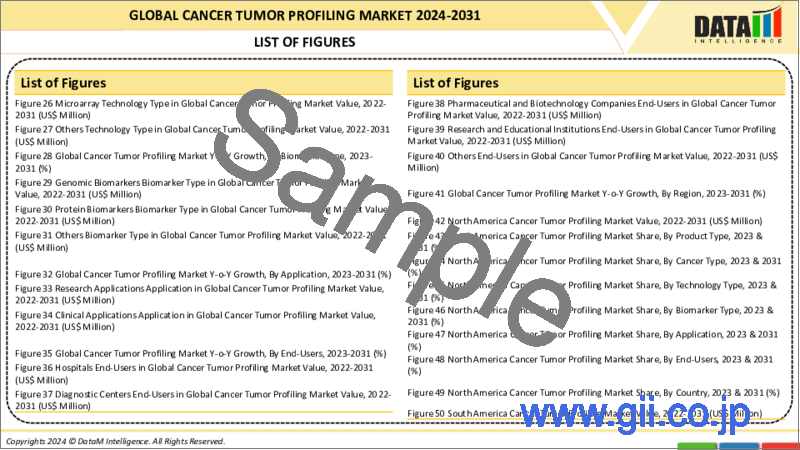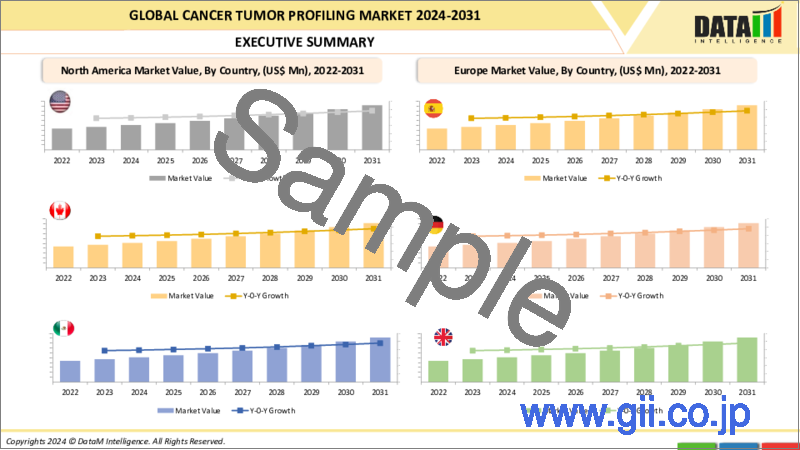|
|
市場調査レポート
商品コード
1560803
がん腫瘍プロファイリングの世界市場:2024年~2031年Global Cancer Tumor Profiling Market - 2024 - 2031 |
||||||
カスタマイズ可能
適宜更新あり
|
|||||||
| がん腫瘍プロファイリングの世界市場:2024年~2031年 |
|
出版日: 2024年09月23日
発行: DataM Intelligence
ページ情報: 英文 181 Pages
納期: 即日から翌営業日
|
- 全表示
- 概要
- 目次
レポート概要
世界のがん腫瘍プロファイリング市場は、2023年の95億米ドルから、2031年には191億5,000万米ドルに達し、予測期間2024年~2031年のCAGRで9.4%の成長が予測されています。
腫瘍プロファイリングは、腫瘍生物学を構成し、がん増殖の根底にある遺伝子変異やその他の変化を調べる検査です。この情報は、医師が腫瘍プロファイルに基づいて個別の治療計画を立てるのに役立ちます。腫瘍プロファイリングは、患者の腫瘍の経路が利用可能な標的治療と一致するかどうかを判断するために腫瘍医が使用する技術です。腫瘍プロファイリングにより、がんの進行や治療抵抗性の原因となる腫瘍の分子特性を深く分析することができます。
バイオマーカー検査としても知られる腫瘍プロファイリングは、がん細胞の詳細かつ高感度な実験室分析です。この検査の目的は、特定のバイオマーカー変異を明らかにし、発見された変異に適合する標的療法を特定することです。腫瘍プロファイリングは、最も効果的な治療計画を導き、特定するのに役立ちます。腫瘍プロファイリングは腫瘍組織のサンプルを採取することから始まります。組織は通常、コアバイオプシーによって採取されます。
市場力学:
促進要因
がんの有病率の増加
世界のがん腫瘍プロファイリング市場の需要は、複数の要因によって牽引されています。がんの有病率の増加は市場成長を促進します。例えば、nih.govが2023年1月に発表した論文によると、米国では195万8310人の新規がん患者と60万9820人のがん死亡者が発生すると予測されています。前立腺がんの罹患率は、20年間減少した後、2014年から2019年にかけて毎年3%増加し、99,000人の新規症例が追加されることになります。
さらに、wcrf.orgによると、非黒色腫皮膚がん(NMSC)を含めると、2022年には19,976,499人のがん患者が発生します。NMSCを除くと、2022年には世界中で18,741,966人のがん患者が発生します。このうち、男性が956万6,825人、女性が917万5,141人です。さらに、IARCによれば、2022年に新たに発生するがん(非黒色腫皮膚がん[NMSC]を含む)は2,000万件に迫り、がんによる死亡者(NMSCを含む)は970万人に上ります。推計によると、生涯にがんに罹患するのは男性または女性の約5人に1人で、死亡するのは男性の約9人に1人、女性の約12人に1人です。肺がんは2022年に最も多く診断されるがんで、約250万人の新規症例、すなわち世界のがんの8人に1人(世界の全がんの12.4%)を占める。
抑制要因
手技に伴う高コスト、医療インフラの不足、償還政策の欠如、サンプル採取と保管条件における技術的問題などの要因が、市場の妨げになると予想されます。
市場セグメンテーション分析
世界のがん腫瘍プロファイリング市場は、がんの種類、技術の種類、バイオマーカーの種類、用途、エンドユーザー、地域に基づいて区分されます。
次世代シーケンシングセグメントは世界のがん腫瘍プロファイリング市場シェアの約48.9%を占める
予測期間中、次世代シーケンシングセグメントが最大の市場シェアを占めると予想されます。このセグメントでは、技術的進歩がこの市場を牽引するであろう。
次世代シーケンシング(NGS)は、超並列シーケンシングとしても知られ、がんに関する大量のゲノム情報を取得する効果的な方法です。ほとんどのNGS技術は、合成によるシーケンスに軸足を置いています。配列決定される各DNA断片はアレイに結合され、DNAポリメラーゼが標識ヌクレオチドを順次付加していく。高解像度カメラが、各ヌクレオチドが統合されていくシグナルをとらえ、空間座標と時間を記録します。各スポットの塩基配列は、コンピュータープログラムによって推測され、リードと呼ばれる連続したDNA配列が生成されます。
例えば、2023年4月、アジレント・テクノロジー社は、広範な固形腫瘍タイプの体細胞変異プロファイリング用に設計されたAgilent SureSelect Cancer CGP Assayの発売を発表しました。この汎がんアッセイのデザインは、主要ながんデータベースから世界的にキュレートされた679遺伝子からなるNGSパネルと、主要な臨床がん研究者との提携に基づいています。
地域別市場分析
北米はがん腫瘍プロファイリング世界市場シェアの約43.6%を占める
予測期間中、北米地域が最大の市場シェアを占めると予想されます。同地域におけるがん罹患率の上昇と技術の進歩が、市場の推進力となっています。
例えば、nih.govが2024年1月に発表した記事によると、米国では新たに2,001,140人のがん患者が発生し、611,720人が死亡すると予測されています。がん死亡率は2021年まで低下し続け、1991年以来400万人以上の死亡が回避されました。これは、喫煙の減少、一部のがんの早期発見、補助療法と転移の両方における治療選択肢の改善によるものです。しかし、上位10がんのうち6がんの罹患率が上昇しているため、これらの利益は脅かされています。
さらに2023年9月、Decision MedicineのリーダーであるPillar Biosciences, Inc.は、リキッドバイオプシーに基づく汎がん腫瘍プロファイリングのためのソリューションを研究室に提供できるように設計された研究用(RUO)次世代シーケンシング(NGS)キットであるoncoReveal Core LBxの世界の発売を発表しました。
目次
第1章 調査手法と調査範囲
第2章 定義と概要
第3章 エグゼクティブサマリー
第4章 市場力学
- 影響要因
- 促進要因
- がんの有病率の増加
- 技術の進歩
- 政府の取り組みと資金援助
- 抑制要因
- 高額な治療費
- 医療インフラの欠如
- 償還政策の欠如
- サンプル採取における技術的問題
- 機会
- 影響分析
- 促進要因
第5章 産業分析
- ポーターのファイブフォース分析
- サプライチェーン分析
- 価格分析
- 規制分析
- アンメットニーズ
- PESTEL分析
- 特許分析
- SWOT分析
第6章 がんタイプ別
- 肺がん
- 前立腺がん
- 乳がん
- 大腸がん
- 黒色腫がん
- その他
第7章 技術タイプ別
- イムノアッセイ
- 次世代シーケンシング
- ポリメラーゼ連鎖反応
- in-situハイブリダイゼーション
- マイクロアレイ
- その他
第8章 バイオマーカータイプ別
- ゲノムバイオマーカー
- プロテインバイオマーカー
- その他
第9章 用途別
- 研究用途
- 臨床用途
- 診断
- 個別化医薬品
- その他
第10章 エンドユーザー別
- 病院
- 診断センター
- 研究・教育機関
- その他
第11章 地域別
- 北米
- 米国
- カナダ
- メキシコ
- 欧州
- ドイツ
- 英国
- フランス
- イタリア
- スペイン
- その他欧州
- 南米
- ブラジル
- アルゼンチン
- その他南米
- アジア太平洋
- 中国
- インド
- 日本
- 韓国
- その他アジア太平洋地域
- 中東・アフリカ
第12章 競合情勢
- 競合シナリオ
- 市況/シェア分析
- M&A分析
第13章 企業プロファイル
- Qiagen N.V
- 会社概要
- 製品ポートフォリオと説明
- 財務概要
- 主な発展
- NeoGenomics Laboratories
- Genomic Health Inc.
- Caris Life Sciences
- Helomics Corporation
- NanoString Technologies
- Sysmex Corporation
- Ribomed Biotechnologies Inc.
- Roche Diagnostics
- Illumina Inc.
第14章 付録
Report Overview
The Global Cancer Tumor Profiling Market reached US$ 9.5 billion in 2023 and is expected to reach US$ 19.15 billion by 2031, growing at a CAGR of 9.4% during the forecast period 2024-2031.
Tumor profiling is a laboratory test to check for gene mutations or other alterations that make up the tumor biology and underlie the cancer growth. This information can help physicians build a personalized treatment plan based on the tumor profile. Tumor profiling is the technology oncologists use to determine if the pathways of a patient's tumor match up with available targeted treatments. Tumor profiling allows for deep analysis of a tumor's molecular characteristics that are responsible for cancer progression and therapy resistance.
Tumor profiling, also known as biomarker testing, is a detailed and sensitive laboratory analysis of cancer cells. The purpose of this testing expose specific biomarker mutations and identify targeted therapies matched to any found mutations. Tumor profiling can help guide and identify the most effective treatment plan. Tumor profiling starts with obtaining a sample of tumor tissue. The tissue is usually collected through a core biopsy.
Market Dynamics: Drivers
Increasing prevalence of cancer
The demand for the global cancer tumor profiling market is driven by multiple factors. The rising prevalence of cancers propels the market growth. For instance, according to an article published by nih.gov in January 2023, 1,958,310 new cancer cases and 609,820 cancer deaths are projected to occur in the United States. Cancer incidence increased for prostate cancer by 3% annually from 2014 through 2019 after two decades of decline, translating to an additional 99,000 new cases.
Moreover, according to wcrf.org, including non-melanoma skin cancer (NMSC) there were 19,976,499 cancer cases in 2022. When NMSC was excluded, this number dropped to 18,741,966 cancer cases around the world in 2022. Of these, 9,566,825 were in men and 9,175,141 in women. Moreover, according to IARC, There were close to 20 million new cases of cancer in the year 2022 (including nonmelanoma skin cancers [NMSCs]) alongside 9.7 million deaths from cancer (including NMSC). The estimates suggest that approximately one in five men or women develop cancer in a lifetime, whereas around one in nine men and one in 12 women die from it. Lung cancer was the most frequently diagnosed cancer in 2022, responsible for almost 2.5 million new cases, or one in eight cancers worldwide (12.4% of all cancers globally).
Restraints
Factors such as high cost associated with the procedure, lack of healthcare infrastructure, lack of reimbursement policies, and technical issues in sample collection and storage conditions are expected to hamper the market.
Market Segment Analysis
The global cancer tumor profiling market is segmented based on cancer type, technology type, biomarker type, application, end-user, and region.
The segment next-generation sequencing accounted for approximately 48.9% of the global cancer tumor profiling market share
The next-generation sequencing segment is expected to hold the largest market share over the forecast period. In this segment, technological advancements would drive this market.
Next-generation sequencing (NGS), also known as massively parallel sequencing, represents an effective way to capture a large amount of genomic information about a cancer. Most NGS technologies revolve around sequencing by synthesis. Each DNA fragment to be sequenced is bound to an array, and then DNA polymerase adds labeled nucleotides sequentially. A high-resolution camera captures the signal from each nucleotide becoming integrated and notes the spatial coordinates and time. The sequence at each spot can then be inferred by a computer program to generate a contiguous DNA sequence, referred to as a read.
For instance, in April 2023, Agilent Technologies Inc. announced the launch of the Agilent SureSelect Cancer CGP Assay designed for somatic variant profiling for a broad range of solid tumor types. The pan-cancer assay design is based on an NGS panel comprising 679 genes globally curated from leading cancer databases and in partnership with key clinical cancer researchers.
Market Geographical Analysis
North America accounted for approximately 43.6% of the global cancer tumor profiling market share
North America region is expected to hold the largest market share over the forecast period. The rising incidence of cancer, and technological advancements, in this region, help to propel the market.
For instance, according to an article published by nih.gov in January 2024, 2,001,140 new cancer cases and 611,720 cancer deaths are projected to occur in the United States. Cancer mortality continued to decline through 2021, averting over 4 million deaths since 1991 because of reductions in smoking, earlier detection for some cancers, and improved treatment options in both adjuvant and metastatic settings. However, these gains are threatened by increasing incidence for 6 of the top 10 cancers.
Moreover, in September 2023, Pillar Biosciences, Inc., the leader in Decision Medicine, announced the global launch of oncoReveal Core LBx, a research-use-only (RUO) next-generation sequencing (NGS) kit designed to enable laboratories with a solution for liquid biopsy-based pan-cancer tumor profiling.
Market Segmentation
By Cancer Type
Lung Cancer
Prostate Cancer
Breast Cancer
Colorectal Cancer
Melanoma cancer
Others
By Technology Type
Immunoassays
Next-Generation Sequencing
Polymerase Chain Reaction
In-Situ Hybridization
Microarray
Others
By Biomarker Type
Genomics Biomarker
Protein Biomarker
Others
By Application
Research Applications
Clinical Applications
Diagnostics
Personalized Medicines
Others
By End-User
Hospitals
Diagnostic Centers
Research and Academic Institutions
Others
By Region
North America
U.S.
Canada
Mexico
Europe
Germany
U.K.
France
Spain
Italy
Rest of Europe
South America
Brazil
Argentina
Rest of South America
Asia-Pacific
China
India
Japan
South Korea
Rest of Asia-Pacific
Middle East and Africa
Market Competitive Landscape
The major global players in the global cancer tumor profiling market include Qiagen N.V, NeoGenomics Laboratories, Genomic Health Inc., Caris Life Sciences, Helomics Corporation, NanoString Technologies Inc., Sysmex Corporation, Ribomed Biotechnologies Inc., Roche Diagnostics and Illumina Inc. among others.
Key Developments
In May 2024, Foundation Medicine Inc. announced the U.S. launch of FoundationOne(R)RNA, a tissue-based RNA sequencing test for the detection of cancer-related fusions across 318 genes. FoundationOne RNA enables reporting of fusions in all solid tumors and may be valuable for detecting fusions in certain cancers, such as non-small cell lung cancer (NSCLC), pancreatic cancer, cholangiocarcinoma, sarcoma, thyroid cancer, and bladder cancer.
In November 2023, Illumina Inc. announced a new generation of its distributed liquid biopsy assay for genomic profiling. The new TruSight(TM) Oncology 500 ctDNA v2 (TSO 500 ctDNA v2) is a research assay that enables noninvasive comprehensive genomic profiling (CGP) of circulating tumor DNA (ctDNA) from blood when tissue testing is not available or to complement tissue-based testing.
Why Purchase the Report?
To visualize the global cancer tumor profiling market segmentation based on cancer type, technology type, biomarker type, application, end-user, and region, as well as understand key commercial assets and players.
Identify commercial opportunities by analyzing trends and co-development
Excel data sheet with numerous data points of global cancer tumor profiling market level with all segments.
PDF report consists of a comprehensive analysis after exhaustive qualitative interviews and an in-depth study.
Product mapping is available in Excel consisting of key products of all the major players.
The global cancer tumor profiling market report would provide approximately 51 tables, 54 figures, and 181 Pages.
Target Audience 2024
Manufacturers/ Buyers
Industry Investors/Investment Bankers
Research Professionals
Emerging Companies
Table of Contents
1. Methodology and Scope
- 1.1. Research Methodology
- 1.2. Research Objective and Scope of the Report
2. Definition and Overview
3. Executive Summary
- 3.1. Snippet by Cancer Type
- 3.2. Snippet by Technology Type
- 3.3. Snippet by Biomarker Type
- 3.4. Snippet by Application
- 3.5. Snippet by End-User
- 3.6. Snippet by Region
4. Dynamics
- 4.1. Impacting Factors
- 4.1.1. Drivers
- 4.1.1.1. Increasing Prevalence of Cancer
- 4.1.1.2. Technological Advancements
- 4.1.1.3. Government Initiatives and Fundings
- 4.1.2. Restraints
- 4.1.2.1. High Costs of Procedure
- 4.1.2.2. Lack of Healthcare Infrastructure
- 4.1.2.3. Lack of Reimbursement Policies
- 4.1.2.4. Technical Issues in Collecting Samples
- 4.1.3. Opportunity
- 4.1.4. Impact Analysis
- 4.1.1. Drivers
5. Industry Analysis
- 5.1. Porter's Five Force Analysis
- 5.2. Supply Chain Analysis
- 5.3. Pricing Analysis
- 5.4. Regulatory Analysis
- 5.5. Unmet Needs
- 5.6. PESTEL Analysis
- 5.7. Patent Analysis
- 5.8. SWOT Analysis
6. By Cancer Type
- 6.1. Introduction
- 6.1.1. Market Size Analysis and Y-o-Y Growth Analysis (%), By Cancer Type
- 6.1.2. Market Attractiveness Index, By Cancer Type
- 6.2. Lung Cancer*
- 6.2.1. Introduction
- 6.2.2. Market Size Analysis and Y-o-Y Growth Analysis (%)
- 6.3. Prostate Cancer
- 6.4. Breast Cancer
- 6.5. Colorectal Cancer
- 6.6. Melanoma Cancer
- 6.7. Others
7. By Technology Type
- 7.1. Introduction
- 7.1.1. Market Size Analysis and Y-o-Y Growth Analysis (%), By Technology Type
- 7.1.2. Market Attractiveness Index, By Technology Type
- 7.2. Immunoassays*
- 7.2.1. Introduction
- 7.2.2. Market Size Analysis and Y-o-Y Growth Analysis (%)
- 7.3. Next-Generation Sequencing
- 7.4. Polymerase Chain Reaction
- 7.5. In-Situ Hybridization
- 7.6. Microarray
- 7.7. Others
8. By Biomarker Type
- 8.1. Introduction
- 8.1.1. Market Size Analysis and Y-o-Y Growth Analysis (%), By Biomarker Type
- 8.1.2. Market Attractiveness Index, By Biomarker Type
- 8.2. Genomics Biomarker*
- 8.2.1. Introduction
- 8.2.2. Market Size Analysis and Y-o-Y Growth Analysis (%)
- 8.3. Protein Biomarker
- 8.4. Others
9. By Application
- 9.1. Introduction
- 9.1.1. Market Size Analysis and Y-o-Y Growth Analysis (%), By Application
- 9.1.2. Market Attractiveness Index, By Application
- 9.2. Research Applications*
- 9.2.1. Introduction
- 9.2.2. Market Size Analysis and Y-o-Y Growth Analysis (%)
- 9.3. Clinical Applications
- 9.4. Diagnostics
- 9.5. Personalized Medicines
- 9.6. Others
10. By End-User
- 10.1. Introduction
- 10.1.1. Market Size Analysis and Y-o-Y Growth Analysis (%), By End-User
- 10.1.2. Market Attractiveness Index, By End-User
- 10.2. Hospitals*
- 10.2.1. Introduction
- 10.2.2. Market Size Analysis and Y-o-Y Growth Analysis (%)
- 10.3. Diagnostic Centers
- 10.4. Research and Educational Institutions
- 10.5. Others
11. By Region
- 11.1. Introduction
- 11.1.1. Market Size Analysis and Y-o-Y Growth Analysis (%), By Region
- 11.1.2. Market Attractiveness Index, By Region
- 11.2. North America
- 11.2.1. Introduction
- 11.2.2. Key Region-Specific Dynamics
- 11.2.3. Market Size Analysis and Y-o-Y Growth Analysis (%), By Cancer Type
- 11.2.4. Market Size Analysis and Y-o-Y Growth Analysis (%), By Technology Type
- 11.2.5. Market Size Analysis and Y-o-Y Growth Analysis (%), By Biomarker Type
- 11.2.6. Market Size Analysis and Y-o-Y Growth Analysis (%), By Application
- 11.2.7. Market Size Analysis and Y-o-Y Growth Analysis (%), By End-User
- 11.2.8. Market Size Analysis and Y-o-Y Growth Analysis (%), By Country
- 11.2.8.1. The U.S.
- 11.2.8.2. Canada
- 11.2.8.3. Mexico
- 11.3. Europe
- 11.3.1. Introduction
- 11.3.2. Key Region-Specific Dynamics
- 11.3.3. Market Size Analysis and Y-o-Y Growth Analysis (%), By Cancer Type
- 11.3.4. Market Size Analysis and Y-o-Y Growth Analysis (%), By Technology Type
- 11.3.5. Market Size Analysis and Y-o-Y Growth Analysis (%), By Biomarker Type
- 11.3.6. Market Size Analysis and Y-o-Y Growth Analysis (%), By Application
- 11.3.7. Market Size Analysis and Y-o-Y Growth Analysis (%), By End-User
- 11.3.8. Market Size Analysis and Y-o-Y Growth Analysis (%), By Country
- 11.3.8.1. Germany
- 11.3.8.2. UK
- 11.3.8.3. France
- 11.3.8.4. Italy
- 11.3.8.5. Spain
- 11.3.8.6. Rest of Europe
- 11.4. South America
- 11.4.1. Introduction
- 11.4.2. Key Region-Specific Dynamics
- 11.4.3. Market Size Analysis and Y-o-Y Growth Analysis (%), By Cancer Type
- 11.4.4. Market Size Analysis and Y-o-Y Growth Analysis (%), By Technology Type
- 11.4.5. Market Size Analysis and Y-o-Y Growth Analysis (%), By Biomarker Type
- 11.4.6. Market Size Analysis and Y-o-Y Growth Analysis (%), By Application
- 11.4.7. Market Size Analysis and Y-o-Y Growth Analysis (%), By End-User
- 11.4.8. Market Size Analysis and Y-o-Y Growth Analysis (%), By Country
- 11.4.8.1. Brazil
- 11.4.8.2. Argentina
- 11.4.8.3. Rest of South America
- 11.5. Asia-Pacific
- 11.5.1. Introduction
- 11.5.2. Key Region-Specific Dynamics
- 11.5.3. Market Size Analysis and Y-o-Y Growth Analysis (%), By Cancer Type
- 11.5.4. Market Size Analysis and Y-o-Y Growth Analysis (%), By Technology Type
- 11.5.5. Market Size Analysis and Y-o-Y Growth Analysis (%), By Biomarker Type
- 11.5.6. Market Size Analysis and Y-o-Y Growth Analysis (%), By Application
- 11.5.7. Market Size Analysis and Y-o-Y Growth Analysis (%), By End-User
- 11.5.8. Market Size Analysis and Y-o-Y Growth Analysis (%), By Country
- 11.5.8.1. China
- 11.5.8.2. India
- 11.5.8.3. Japan
- 11.5.8.4. South Korea
- 11.5.8.5. Rest of Asia-Pacific
- 11.6. Middle East and Africa
- 11.6.1. Introduction
- 11.6.2. Key Region-Specific Dynamics
- 11.6.3. Market Size Analysis and Y-o-Y Growth Analysis (%), By Cancer Type
- 11.6.4. Market Size Analysis and Y-o-Y Growth Analysis (%), By Technology Type
- 11.6.5. Market Size Analysis and Y-o-Y Growth Analysis (%), By Biomarker Type
- 11.6.6. Market Size Analysis and Y-o-Y Growth Analysis (%), By Application
- 11.6.7. Market Size Analysis and Y-o-Y Growth Analysis (%), By End-User
12. Competitive Landscape
- 12.1. Competitive Scenario
- 12.2. Market Positioning/Share Analysis
- 12.3. Mergers and Acquisitions Analysis
13. Company Profiles
- 13.1. Qiagen N.V *
- 13.1.1. Company Overview
- 13.1.2. Product Portfolio and Description
- 13.1.3. Financial Overview
- 13.1.4. Key Developments
- 13.2. NeoGenomics Laboratories
- 13.3. Genomic Health Inc.
- 13.4. Caris Life Sciences
- 13.5. Helomics Corporation
- 13.6. NanoString Technologies
- 13.7. Sysmex Corporation
- 13.8. Ribomed Biotechnologies Inc.
- 13.9. Roche Diagnostics
- 13.10. Illumina Inc. (*LIST NOT EXHAUSTIVE)
14. Appendix
- 14.1. About Us and Services
- 14.2. Contact Us






